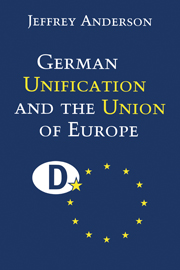Crossref Citations
This Book has been
cited by the following publications. This list is generated based on data provided by Crossref.
Maull, Hanns W.
2001.
Deutschland-TrendBuch.
p.
645.
Jeffery, Charlie
and
Paterson, William E.
2001.
Interlocking Dimensions of European Integration.
p.
179.
Lequesne, Christian
and
Bulmer, Simon
2002.
New Perspectives on EU-Member State Relationships.
SSRN Electronic Journal,
Dyson, Tom
2002.
Civilian power and ‘history‐making’ decisions: German agenda‐setting on Europe.
European Security,
Vol. 11,
Issue. 1,
p.
27.
Marsh, Steve
2002.
The dangers of German history: Lessons from a decade of post‐cold war German foreign and security policy1.
Perspectives on European Politics and Society,
Vol. 3,
Issue. 3,
p.
389.
Martin, Andrew
and
Ross, George
2004.
Euros and Europeans.
Schweiger, Christian
2005.
The Role of the Modell Deutschland in the Enlarged European Union.
Debatte: Journal of Contemporary Central and Eastern Europe,
Vol. 13,
Issue. 3,
p.
243.
Baumann, Rainer
2005.
Konstruktivistische Analysen der internationalen Politik.
p.
99.
Parsons, Craig
2007.
Puzzling out the EU role in national politics.
Journal of European Public Policy,
Vol. 14,
Issue. 7,
p.
1135.
Patterson, William R.
2008.
Smart power in reunified Germany.
Journal of Power,
Vol. 1,
Issue. 3,
p.
339.
Hurrelmann, Achim
2008.
Constructing Multilevel Legitimacy in the European Union: A Study of British and German Media Discourse.
Comparative European Politics,
Vol. 6,
Issue. 2,
p.
190.
Kim, Min-hyung
2010.
State Preferences and Institutional Feedback: CAP and European Integration.
International Political Science Review,
Vol. 31,
Issue. 3,
p.
323.
Exadaktylos, Theofanis
2012.
Research Design in European Studies.
p.
195.
Duina, Francesco
2012.
The Wiley‐Blackwell Encyclopedia of Globalization.
Giraud, Olivier
2013.
Focus — Les voies plurielles du changement dans les systèmes scolaires en France et en Allemagne.
Informations sociales,
Vol. n° 175,
Issue. 1,
p.
42.
Giraud, Olivier
2013.
L’accès à l’emploi des jeunes en France et en Allemagne : nouveaux défis et changements d’échelles.
Espace populations sociétés,
p.
57.
Meiers, Franz-Josef
2015.
Germany’s Role in the Euro Crisis.
p.
1.
Kiratli, Osman Sabri
2016.
Political discourses on Europe and European integration in national election manifestos and party programmes.
Cambridge Review of International Affairs,
Vol. 29,
Issue. 2,
p.
636.
Wigell, Mikael
2016.
Conceptualizing regional powers’ geoeconomic strategies: neo-imperialism, neo-mercantilism, hegemony, and liberal institutionalism.
Asia Europe Journal,
Vol. 14,
Issue. 2,
p.
135.
Davidson-Schmich, Louise K.
2017.
LGBT Politics in Germany: Unification as a Catalyst for Change.
German Politics,
Vol. 26,
Issue. 4,
p.
534.



